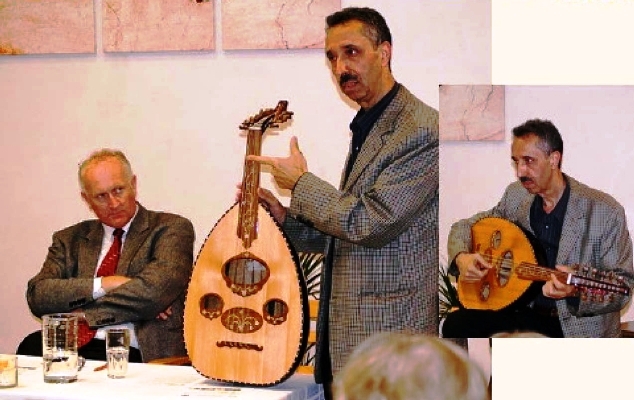![]()
The Words of the Haider Family
|
|
The Words of the Haider Family |

Seebenstein, Austria -- Within the Austrian branch of UPF it has become a tradition since 2003 to organize a Peace Conference on the weekend of summer solstice in a conference center near Seebenstein, located in the forests some 60 km south of Vienna. Responding to the announcement of the UN which declared 2010 as the "Year of the Rapprochement of Cultures," UPF-Austria invited experts to speak on a variety of topics representing different cultures of the world.
To start the program Elder Reuben Silverbird organized an Original Native Circle Dance on the green lawn in front of the conference hall, which gave to all participants a sense of unity and connectedness with Mother Earth.
As an introduction Peter Haider, Secretary General of UPF-Austria, explained the meaning of the "Rapprochement of Cultures" as it is explained in the dossiers published by UNESCO. UPF's activities in Austria and worldwide are specially attached to this topic, as UPF always supports initiatives to build bridges between religions and cultures. Its founder Rev. Sun Myung Moon even suggested establishing an inter-religious council within the United Nations.
As a first speaker Bashir Mirzo, who comes from a Syrian family of musicians, spoke about "Music in the Orient." He explained how it differs from Western musical styles and spoke about the influence of India and Persia on the music in Arab countries. Finally he gave a taste of the magic of this music by showing different rhythms on his percussion instruments and playing his Bedouin flute and the Oud, which is the ancestor of the European lute.
Then Dr. Habib Bakhoum, a native of the West African country of Senegal, spoke about Africa as the cradle of humankind. He stated that despite the differences in their color of skin human beings have exactly the same DNA, whether they are white, black, or yellow. So even white European have to get used to the fact that their ancestors might have come from Africa. He also made a point that for Africans in their traditional world view, life does not end with death, which is a natural part of human experience, but that the ancestors are always with us and sometimes we might sense them in the wind, in the trees, or in shadows.
The second round of discussions started with a lecture by Alexej Klutschewsky, a social anthropologist, on the importance of Orthodox Christianity in Russia today. He spoke about the beginnings of the conversion of Russians when they where baptized en masse in the Dnieper River in 988 in Kiev, which is in modern Ukraine. He explained how Russia tried to inherit the role of the Eastern Roman empire after the fall of Constantinople. After the persecution under Communism, the Orthodox Church is experiencing a resurrection today. Many new churches are being built and even the political leadership seeks its support in giving renewed identity to the nation after the failure of atheism. The arms of the church are reaching far beyond the current Russian territory, and its Patriarch Cyril has the flags of many of the states of the former Sow jet Union in his office.
As a representative of the young generation Kaidi Cui, a Chinese student of music in Vienna whose mother is an expert in Chinese medicine, spoke about the meaning of the different animals in the Chinese Zodiac. Everybody listened carefully when his or her year of birth was related to one of the animals and when the strong and week points of the respective characters were explained. She then went into detail how Chinese traditionally celebrate their holidays.
As a final speaker Dr. Leo Gabriel, journalist, anthropologist and expert on Latin America, reported about a conference which was organized a few weeks ago in Bolivia by president Evo Morales, who is only the second indigenous president in the history of Latin America in the last 100 years. The wisdom of the old Inca and Maya cultures have survived in the hearts and minds of the indigenous people despite more than 500 of colonial history. Today listening to "Pacha Mama -- Mother Earth" might be helpful even to solve crises such as climate change.
A special part of the program was the celebration of the 80th birthday of Elder Reuben Silverbird, who has become an active Ambassador for Peace after making Austria his home more than ten years ago. He is still travelling extensively to other European countries and even other continents, giving concerts and preaching his message of peace which he published last year in a beautifully illustrated book. After the cutting of the birthday cake he told us his life's story being born blind and how this was such a precious experience until he gained his eyesight when he was four years old. He also spoke about the desire of the original Native Americans to have a land of their own like the Palestinians do. Finally he gave us a taste of his musical repertoire ending with a very Austrian song "Es is wias is," which he composed after listening to an old lady somewhere in an Austrian village who spoke to him in German, a language unfamiliar to him. This song might be a hit at least in Austria one day.
A beautiful dinner buffet concluded a long afternoon. It was prepared by the owners of the beautiful estate in Seebenstein, Eckhart and Dr. Maya Riehl, and by many sisters and brothers whose care and love gave the whole event a vibration of peacefulness and hope which everyone absorbed and took home.